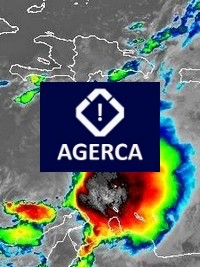|
|
|

Haiti - FLASH : Advice before, during and after a major climatic hazard
22/08/2023 12:13:50
Compared to the geographical position of Haiti in the Caribbean region, the country is very vulnerable to major climatic hazards. In order to reduce the effects on lives and property, the Alliance for Risk Management and Business Continuity (AGERCA) provides guidelines for coping before, during and after a major climatic event such as a storm or hurricane. among others…
General instructions BEFORE the event (not exhaustive):
- Keep yourself constantly informed of the level of alert and the evolution of the weather situation through the media;
- Regularly consult the website of the Hydrometeorological Unit of Haiti here and the weather section of the AGERCA website here, as well as the social networks of AGERCA and Civil Protection;
- Seek today to understand the alert phases, the levels of vigilance and the corresponding safety instructions and precautionary measures;
- Regularly prune trees on your property that could pose a threat to you, your family and people in your immediate environment;
- Identify the safest room in your home that can accommodate the whole family in an emergency;
- Keep away from houses located near rivers, ravines and on mountains at risk of rockslides and landslides.
- Store enough water and non-perishable food to take with you at the time of evacuation for at least 72 hours (camp beds, flashlights, woolen blankets, dry clothes);
- Contact your health care provider if you are sick and need medical attention. Join your loved ones quickly, when the authorities announce a hurricane;
- Allow enough call credit to allow everyone to communicate;
- Check that there are no power lines placed too low or too close to your house and have them replaced;
- Identify temporary shelters in advance in case of evacuation;
- Learn your escape routes, practice with housekeeping, pets;
- Continue to follow measures to protect yourself from COVID-19 and other infectious diseases, such as washing your hands often and cleaning frequently touched surfaces;
- Remember to protect generators, converters (inverters) and batteries;
- Avoid driving except in an emergency;
- Bring rubber boots, shovels, wheelbarrows and pickaxes in case of flooding;
- Make sure your insurance policies and personal documents like ID are up to date. Make copies and store them in a secure, password-protected digital space;
- Keep a supply of gasoline for the generator during this time;
...
General instructions DURING the event (not exhaustive):
- If heavy rain is forecast, avoid hiking in the mountains or near waterways;
- Do not walk, swim or drive in flood waters;
- If rain and strong winds are forecast, avoid activities on the beach and near the beach. Do not go to sea without special obligation;
- Stay away from bridges over flowing water. Fast-moving water can wash away bridges without warning;
...
General instructions AFTER the event t (not exhaustive):
- Check for damaged, clogged or poorly maintained drains that need to be repaired or cleaned;
- Check that all fire extinguishers are working;
- Set up functional lamps in case of power failure;
- Wear thick work gloves, protective clothing and boots while cleaning and use appropriate face coverings or masks if cleaning up mold or other debris;
- Be aware that snakes and other animals may be in your home;
- Check with neighbors, elderly people or those who may need extra help;
- Be aware of the risk of electrocution. Do not touch electrical equipment if it is wet or if you are in water;
- Turn off electricity to avoid electric shock if you can do so safely;
- Avoid wading in flood waters, which may be contaminated and contain debris hazardous to your health;
- Record phone calls for emergencies. Phone systems are often down or busy after a disaster;
- Use SMS or social media to communicate with loved ones so that emergency calls can go through properly;
- Document any material damage with photographs. Contact your insurance company for assistance;
...
HL/ HaitiLibre
|
|
|
|



